Hair loss is a common concern that can significantly impact an individual’s self-esteem and overall well-being. While various factors may contribute to hair loss, stress is a notable trigger that can disrupt the natural hair growth cycle.
Furthermore, elevated cortisol levels due to chronic stress may negatively affect hair follicles in other ways, too [2]. For example, high cortisol levels may push hair follicles into the resting phase prematurely, leading to increased hair shedding and thinning. Also, it may deplete essential nutrients needed for healthy hair growth, and cause hair follicles to become smaller and weaker, resulting in thinner, shorter hairs and - overall hair thinning. There are also other mechanisms through which stress can affect hair health and hair growth cycle in general. We will discuss those in this article.
Understanding the science behind how stress affects hair health in general, but especially hair growth, can help individuals take proactive steps to manage stress and promote healthy hair growth.
Table of content
Understanding hair growth
Hair growth is a complex process regulated by a cycle consisting of three distinct phases: anagen, catagen, and telogen.
Anagen phase. The anagen phase is the active growth period of hair follicles, lasting somewhere between 2 to 7 years. During this phase, hair cells divide rapidly, leading to the growth of new hair. Approximately 85-90% of the hair on the scalp is in the anagen phase at any given time.
Catagen phase. The catagen phase is a short transition stage that lasts about 2-3 weeks. During this period, hair growth slows, and the hair follicle begins to shrink. This phase marks the end of the active growth period and prepares the hair follicle for the next phase.
Telogen phase. The telogen phase is actually the „resting“period of the hair growth cycle, lasting around 3 months. During this phase, hair growth stops, and the hair follicle remains dormant. At the end of the telogen phase, the old hair sheds, and the cycle restarts with a new anagen phase.
So, healthy hair growth depends on balanced biological processes, where each phase seamlessly transitions to the next. Disruptions in this cycle, such as those caused by stress, can lead to hair loss. We'll briefly discuss the link between stress and hair loss/hair thinning.
As your leading source for hair health information over the past 4 years, we never compromise on accuracy. When it comes to your health, you deserve information you can truly rely on - and earning your trust is our top priority.
Here's how Scandinavian Biolabs ensures every piece of content meets the highest standards of accuracy and integrity:
- Credentialed Experts: Our reviewers are actively practicing doctors and medical researchers
- Stringent Reviews: Content undergoes rigorous editing by subject specialists and review by a practicing doctor.
- Evidence-Based: We rely on well-established research from trusted scientific sources like peer-reviewed journals and health authorities.
- Full Transparency: Our editorial standards, writer credentials, reviewer credentials, correction process, and funding are all publicly documented.
- Independent Voice: While we do promote products, we operate in a vacuum to business operations. Our main goal is just an unwavering commitment to providing medically-sound guidance.
You can count on Scandinavian Biolabs to consistently deliver the trustworthy health information you deserve. Read our Editorial Standards.
The science behind stress and hair loss
Stress, whether emotional or physical, may greatly impact hair growth by triggering hormonal changes. Stress increases the production of cortisol, commonly known as the stress hormone [3]. Elevated cortisol levels can interfere with the hair growth cycle, leading to various types of hair loss [4].
Disrupted hair growth cycle
According to research, high cortisol levels can inhibit the production of essential molecules, such as proteoglycans, that support hair follicle health and growth [1]. Stress-induced hormonal imbalances can alter the signalling pathways that regulate the hair growth cycle, pushing hair follicles prematurely into the telogen phase [2].
The brain control of hair growth cascade also seems to be affected, according to research, which represents an in vivo-evidence for the existence of a defined brain-hair follicle axis [5]. That, in turn, suggests that psychoemotional and other stressors may prematurely terminate hair growth.
Hair thinning
Chronic stress may also cause hair follicles to become smaller and weaker, resulting in thinner, shorter hairs and an overall loss of volume.
Depleted essential nutrients
Elevated cortisol levels can deplete essential nutrients required for healthy hair growth [6], as the body prioritises dealing with stress over nutrient distribution.
Disrupted sebum production
Besides, stress-induced cortisol can affect scalp health by disrupting the balance of oils and substances, creating an unhealthy environment for hair growth [7].
Inflammation
Another possible pathway of hair loss or hair thinning related to stress is – inflammation. Namely, elevated cortisol levels can lead to (chronic) inflammation [8], which can damage hair follicles and hinder healthy hair growth [9].
3 ways stress can impact hair growth

While stress can cause hair loss, it’s not the only way it has an influence on the condition. Below we’ll explore the three ways psychological and physiological distress can impact hair growth [10].
1. Stress as a primary inducer of hair loss
As discussed above, chronic or acute stress can prematurely push hair into the telogen phase of the growth cycle, causing more hair to fall out than normal (telogen effluvium).
2. Stress as an aggravating factor
Although many hair loss types are not caused by stress, stress can aggravate existing conditions triggered by other factors, such as male or female pattern hair loss or alopecia areata.
3. Stress as a response to hair loss
Hair loss is an emotionally taxing experience for many, significantly impacting self-esteem. This pressure can further aggravate the issue, creating a vicious cycle.
Types of hair loss associated with stress
Stress-related hair loss can manifest in several forms. Here are some examples:
- Telogen Effluvium: Telogen effluvium is a common type of hair loss triggered by stress. It occurs when a significant number of hair follicles enter the telogen phase prematurely [11]. As a result, hair shedding increases, and noticeable thinning occurs. Telogen effluvium is usually temporary, and hair growth usually resumes once the underlying stress is managed [10].
How does stress affect this condition? Acute or chronic stress directly disrupts the hair growth cycle, leading to sudden hair shedding.
- Alopecia Areata: Alopecia areata is a known autoimmune condition where the body’s immune system attacks hair follicles, leading to hair loss in patches. While the exact cause of alopecia areata is not fully understood, stress is believed to be a contributing factor that can trigger or exacerbate the condition [12].
How does stress affect this condition? Stress exacerbates this condition, affecting hair growth cycles through hormonal and immune pathways [10].
- Trichotillomania: Trichotillomania is an impulsive, behavioural disorder characterised by an irresistible urge to pull out one’s hair. This compulsive behaviour often arises as a response to stress or anxiety, leading to noticeable hair loss and potential damage to the hair follicles [13].
How does stress affect this condition? Stress can cause an individual to pull out their hair as a coping mechanism, triggering trichotillomania.
Tools to manage stress

Managing stress is crucial for overall health, and it might help mitigate its impact on hair loss as well. There are several different ways to cope with stress, and here are some examples:
-
Meditation: Several studies have demonstrated that regular meditation can help reduce stress by promoting relaxation and mindfulness. Different techniques such as guided meditation, mindfulness meditation, and transcendental meditation can calm the mind and lower cortisol levels.
-
Journaling: Writing down your thoughts and feelings in a journal can be a therapeutic way to process emotions and reduce stress. Journaling can provide you with clarity, help identify stressors, and promote emotional and psychological well-being.
-
Breathing exercises: Deep breathing, such as diaphragmatic breathing, for example, can activate the body’s relaxation response. These exercises help reduce anxiety, lower cortisol levels, and improve overall stress resilience.
-
Exercise: Regular physical activity is not only good for your physical health. It is great for your psychological health, being a powerful stress reliever. Exercise releases endorphins, which are natural mood enhancers. Activities such as yoga, walking, running, and strength training can improve both physical and mental health.
-
Sleep: Adequate sleep is essential for overall health, but also for stress management. Establishing a consistent sleep routine, creating a calming bedtime environment, and avoiding stimulants before bed can improve sleep quality and reduce your stress levels.
-
Nutrition: A balanced diet rich in vitamins, minerals, and antioxidants helps your body cope with stress. Foods such as leafy greens, nuts, seeds, lean proteins, and fruits provide essential nutrients that promote hair health and reduce stress.
Emerging treatments
As we’ve established above, cortisol negatively impacts hair follicles by degrading essential skin components like hyaluronan and proteoglycans, leading to hair disorders. So, several pharmacological and non-pharmacological solutions focus on proteoglycan replacement therapy. Oral supplements containing bioavailable proteoglycans can revitalise hair follicles and prolong the anagen phase, essential for healthy hair growth [10]. Furthermore, treating stress itself is a key, as well as taking proper care of your hair health with quality products of recognised brands.
Conclusion
Understanding the link between stress and hair thinning, or loss is key for taking proactive steps to manage stress and support healthy hair growth. By incorporating effective stress management tools and maintaining a healthy lifestyle, you can, actually, mitigate the impact of stress on your hair and overall well-being.
References
[1] Thom E. Stress and the Hair Growth Cycle: Cortisol-Induced Hair Growth Disruption. J Drugs Dermatol. 2016 Aug 1;15(8):1001-4. PMID: 27538002.
[2] Du F, Li J, Zhang S, Zeng X, Nie J, Li Z. Oxidative stress in hair follicle development and hair growth: Signalling pathways, intervening mechanisms and potential of natural antioxidants. J Cell Mol Med. 2024 Jun;28(12):e18486. doi: 10.1111/jcmm.18486. PMID: 38923380; PMCID: PMC11196958.
[3] Dickerson SS, Kemeny ME. Acute stressors and cortisol responses: a theoretical integration and synthesis of laboratory research. Psychol Bull. 2004 May;130(3):355-91. doi: 10.1037/0033-2909.130.3.355. PMID: 15122924.
[4] O'Sullivan JDB, Peters EMJ, Amer Y, Atuluru P, Chéret J, Rosenberg AM, Picard M, Paus R. The impact of perceived stress on the hair follicle: Towards solving a psychoneuroendocrine and neuroimmunological puzzle. Front Neuroendocrinol. 2022 Jul;66:101008. doi: 10.1016/j.yfrne.2022.101008. Epub 2022 Jun 2. PMID: 35660551.
[5] Peters EM, Arck PC, Paus R. Hair growth inhibition by psychoemotional stress: a mouse model for neural mechanisms in hair growth control. Exp Dermatol. 2006 Jan;15(1):1-13. doi: 10.1111/j.0906-6705.2005.00372.x. PMID: 16364026.
[6] Rajput RJ. Influence of Nutrition, Food Supplements and Lifestyle in Hair Disorders. Indian Dermatol Online J. 2022 Oct 21;13(6):721-724. doi: 10.4103/idoj.idoj_175_22. PMID: 36386748; PMCID: PMC9650738.
[7] Tosti A, Schwartz JR. Role of scalp health in achieving optimal hair growth and retention. Int J Cosmet Sci. 2021 Nov;43 Suppl 1:S1-S8. doi: 10.1111/ics.12708. PMID: 33932025.
[8] Medzhitov R. Origin and physiological roles of inflammation. Nature. 2008 Jul 24;454(7203):428-35. doi: 10.1038/nature07201. PMID: 18650913.
[9] Dahabreh D, Jung S, Renert-Yuval Y, Bar J, Del Duca E, Guttman-Yassky E. Alopecia Areata: Current Treatments and New Directions. Am J Clin Dermatol. 2023 Nov;24(6):895-912. doi: 10.1007/s40257-023-00808-1. Epub 2023 Aug 22. PMID: 37606849.
[10] Thom E. Stress and the Hair Growth Cycle: Cortisol-Induced Hair Growth Disruption. J Drugs Dermatol. 2016 Aug 1;15(8):1001-4. PMID: 27538002.
[11] Asghar F, Shamim N, Farooque U, Sheikh H, Aqeel R. Telogen Effluvium: A Review of the Literature. Cureus. 2020 May 27;12(5):e8320. doi: 10.7759/cureus.8320. PMID: 32607303; PMCID: PMC7320655.
[12] Ahn D, Kim H, Lee B, Hahm DH. Psychological Stress-Induced Pathogenesis of Alopecia Areata: Autoimmune and Apoptotic Pathways. Int J Mol Sci. 2023 Jul 20;24(14):11711. doi: 10.3390/ijms241411711. PMID: 37511468; PMCID: PMC10380371.
[13] Phillips TG, Slomiany WP, Allison R. Hair Loss: Common Causes and Treatment. Am Fam Physician. 2017 Sep 15;96(6):371-378. PMID: 28925637.






